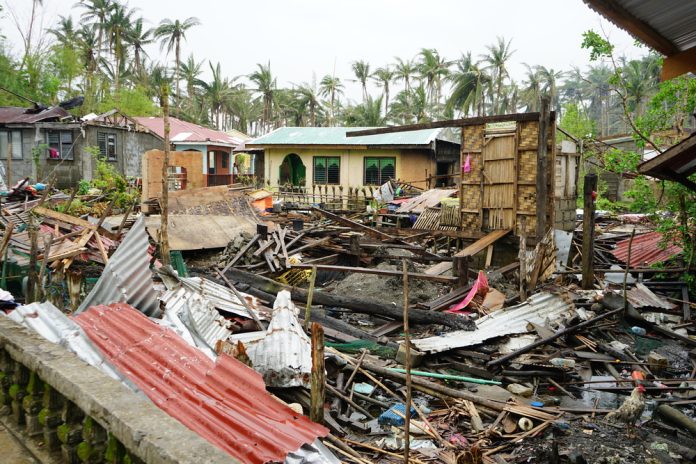Before the storm, the Department of the Interior and Local Government sent a message saying super typhoon Odette (international name: Rai) would be coming on December 16. They said we should get ready, and there would probably be strong winds and big waves.
So on the morning of the 16th, I went around the whole village. I told people that whoever wanted to evacuate should go to our church, because that’s the highest point. The school, which was our usual evacuation center, was near the sea.
By noon the wind was getting stronger. With such strong winds it felt like there was tornado, so my husband and I moved our three children to the church. When we arrived, there were around 30 families there already.
We saw two mango trees fall down on our street. We saw roofs flying off houses, falling to the ground. It looked like the hurricane had peeled the roofs off the houses. The winds were so strong that even as we were walking, it felt like the wind would pick us up. At the church, we saw that someone had been wounded. They had been hit by a metal sheet that had blown off from someone’s roof.
We went to check on our house, my husband said it was gone, it had fallen apart. I looked at other houses, and they were gone too.
We returned to the church, and the winds shifted, suddenly coming from the south. About two hours of winds, so strong that it damaged our church’s roof.
The sea water almost reached the church. We couldn’t do anything but pray. We slept there because we had no home to go to anymore. We didn’t eat that night because nobody could make rice. The next morning, we went to where our homes had been and put together makeshift shelters.
Since the storm, there is nothing else we can do but look at our house and see how we’re going to fix it. Whatever we can save, we fix. What we can’t, we throw away. Our clothes all got wet and we just have to wash them so we have something to use.
Thank God nobody died in this area. Some people were sick, but it was mostly just colds, coughs. We just used herbal medicine to treat it because it’s a long way to the city. The health center was destroyed. We haven’t been able to repair it yet because we’ve been working on our own homes first.
It’s been a month since the storm, and we think about how we can recover. It’s just so hard. My salary as a secretary is not enough. Sometimes we think, how can we bounce back from this?
Our relatives sent help, and we were able to put a roof over our heads. But it’s so hard. Instead of adding to our home, we now have nothing, our house was totally damaged. We’re just thankful that many people sent food. We’ve recovered a little bit. But the pain of homelessness, that’s what we feel.
Marie Kris Yurtes is barangay secretary of Catadman in Surigao City. Survivors and Doctors Without Borders / Médecins Sans Frontières (MSF) facilitated the sharing of stories about the impact of typhoon Odette (international name Rai) that hit the country in December and badly affected some areas in the Philippines.









